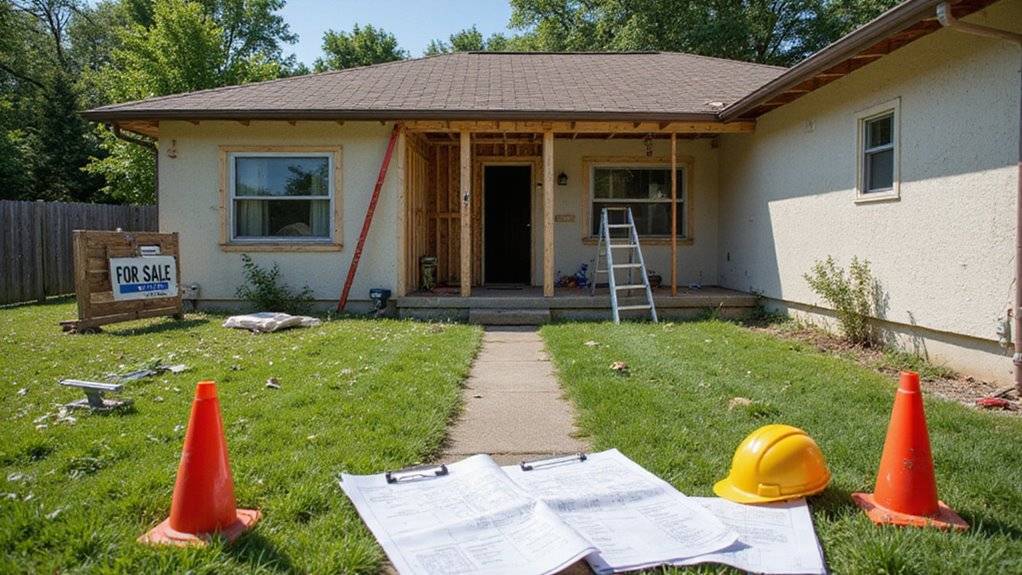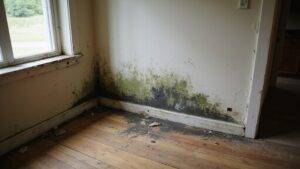Selling a house with open permits or code issues can be tricky. These problems often scare buyers and slow down the sales process. You may worry about lowering your price or even facing legal trouble.
Buyers want homes with clear records and no hidden risks. Open permits and code violations make your home less attractive. Lenders may also refuse financing until you fix these issues.
You can sell a house with open permits and code issues, but you must follow certain steps to protect yourself. You need to disclose problems, understand your options, and know how to handle negotiations.
Careful planning will help you avoid mistakes. This blog will guide you through the steps to solve these challenges and sell your house with confidence.
Key Takeaways
- Sellers must legally disclose all open permits and code violations to potential buyers before closing.
- Open permits and violations can lower property value, deter buyers, and complicate financing or title insurance.
- Resolving permits and code issues before listing helps avoid sale delays and legal complications.
- Selling as-is to investors may speed up the process but often results in lower offers.
- Consult a real estate attorney to ensure proper disclosure, compliance, and protection during the sale.
Understanding Open Permits and Code Violations
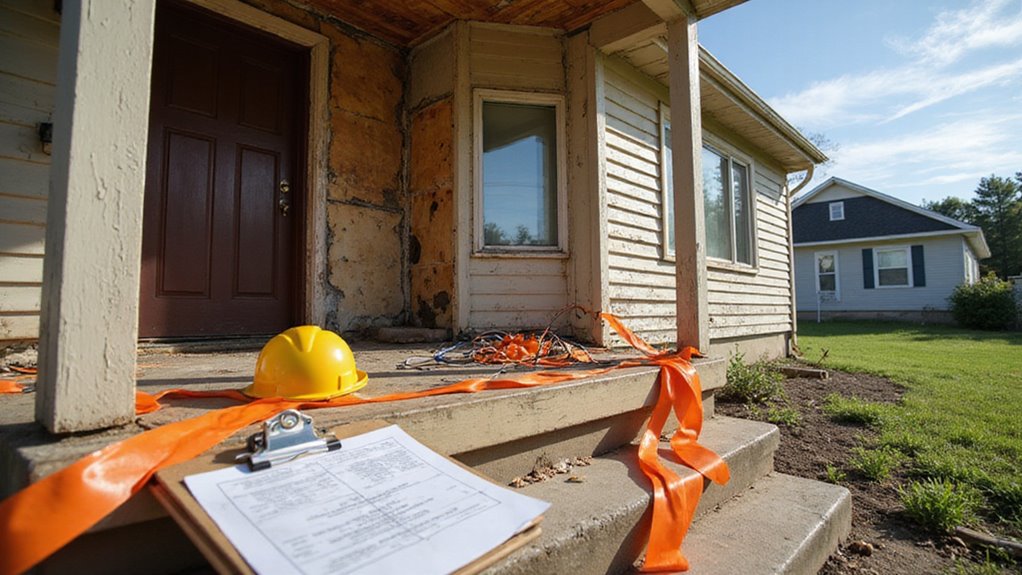
Open permits and code violations are important when selling a house. Open permits mean construction started but was not officially finished. Code violations show the home does not meet building or safety rules. If a permit is open, buyers or lenders may worry about unfinished work.
This can cause delays or problems with your sale. If you resolve open permits, you can reduce these risks. Code violations happen if your home has unapproved work or is unsafe. The city may require repairs or updates before you sell. If you fix code violations, you can help the sale go smoothly. Full disclosure of issues and keeping proper records can protect you from future legal complications.
Understanding these issues lets you fix problems before selling. If you address open permits and code violations, you make a faster sale more likely. Always check with your local building department for help. Some homebuyers, like local St. Louis owned companies, purchase houses as-is even when there are open permits or code issues, offering sellers a simple and stress-free solution.
Common Types of Permits and Violations Affecting Home Sales
When you’re preparing to sell, unresolved building permits and common code violations can quickly complicate your transaction. Buyers and lenders often scrutinize issues like unpermitted additions, electrical upgrades, or safety code lapses. Knowing how these problems impact your sale is essential for a smooth closing.
Sellers in North County, MO can benefit from fair cash offers that allow them to avoid lengthy repairs and delays caused by open permits or code violations. If you want to avoid these complications, consider working with trusted experts who specialize in purchasing homes as-is, regardless of open permits or code issues.
Unresolved Building Permits
Unresolved building permits can delay or complicate selling your home. Open permits show that past work was not properly approved. These permits must be disclosed to buyers by law.
If you have unfinished permits, buyers and lenders may worry about the work’s safety and legality. This could lower your home’s value or cause the buyer to renegotiate. If you ignore disclosure rules, you might face legal trouble even after the sale.
Closing any open permits before listing your home makes selling smoother. It also helps maintain your property’s value. If you address permits early, you avoid delays and extra costs.
Common Code Violations
Common code violations are problems that inspectors often find when a home is being sold. Knowing the most frequent issues can help you avoid delays and extra costs. Homeowners should check for safety and compliance problems before listing a property.
Unpermitted additions are a common violation. Adding rooms or finishing basements without the right permits breaks building and zoning rules. If you make changes without approval, you may face fines or be required to remove the work.
Electrical and plumbing problems are also frequent. Old wiring or illegal plumbing changes can cause safety hazards. If a buyer’s inspector finds these issues, it may delay or cancel the sale.
Changes to the outside of homes in historic districts need special approval. If your home is in one of these areas, unauthorized exterior updates can bring expensive penalties. Always check local rules before making changes.
If you fix common code violations before selling, you can avoid surprises. This helps the sale go smoothly and protects your property’s value. If you are unsure, consider a professional inspection before putting your home on the market.
How to Check for Open Permits on Your Property
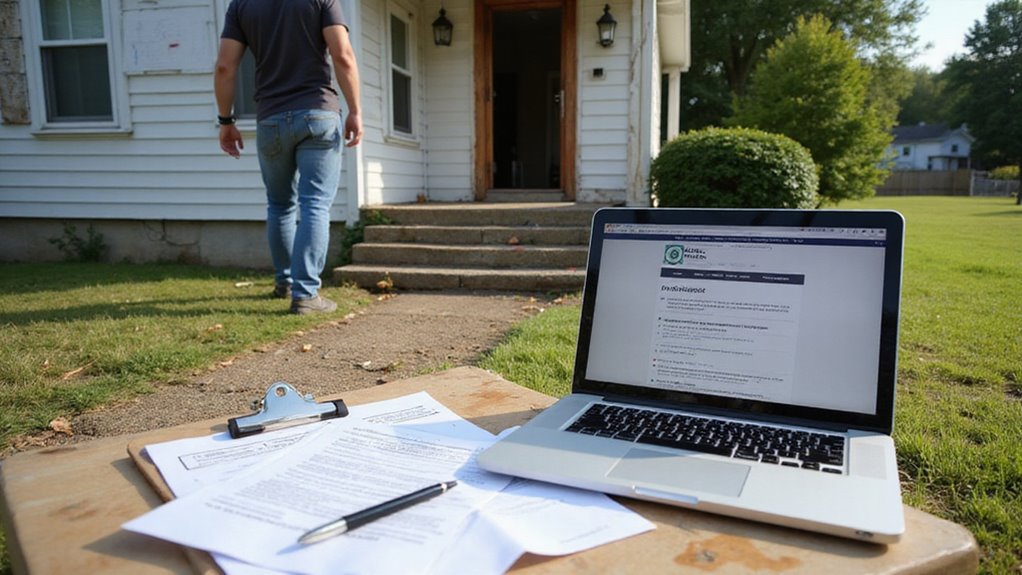
You’ll need to verify whether your property has any open permits before listing it for sale. Start by searching local permit records, reaching out to your city’s building department, or checking online permit portals if available. If you plan to sell the property as-is, remember that many buyers—especially investors—will factor in necessary repairs and updates when making their offers.
These steps give you a clear picture of your property’s compliance and help prevent surprises during the transaction. If you discover open permits or code issues, you may want to consider working with local real estate market experts who can guide you through selling your home as-is and help simplify the process.
Searching Local Permit Records
You should check if your property has any open permits before listing it for sale. Buyers and agents often look at a home’s permit history. This helps you avoid surprises during the selling process.
Start by finding your property’s address and parcel number. Use your city or county’s online permit search tool if available. If not, visit the local records office in person.
Check all records for permits that are open, expired, or incomplete. If you find any issues, resolve them before listing your home. Taking these steps can help protect your sale and your reputation.
Contacting City Building Department
Contact your city’s building department for the most accurate information on open permits for your property. Online searches can help, but city records are more reliable. The department can give you a full permit history.
Bring your property’s parcel number and official address when you call or visit. This information will help staff find your records quickly. Accurate details will make the process smoother.
If you find unresolved permits early, you can fix them before a home inspection or appraisal. Inspectors and appraisers may delay or complicate your sale if permits are open. Official records help you resolve code issues and give buyers correct information.
If you provide accurate disclosures, buyers will trust you more. This can help you negotiate better and close your sale with fewer problems. Always get permit records from the city to avoid surprises.
Reviewing Online Permit Portals
Many cities now have online portals to check for open permits. These sites let you see your property’s permit history easily. If you want to sell, use the portal to find and fix any issues.
You can start by typing your address into the portal’s search bar. The site shows a list of all permits for your property. If a permit is “open,” “incomplete,” or “expired,” it may need your attention.
Some portals let you download or print the permit records. You can keep these for your files or give them to buyers. If you need help, the portal may have instructions or contact details.
The Impact of Open Permits on Property Value
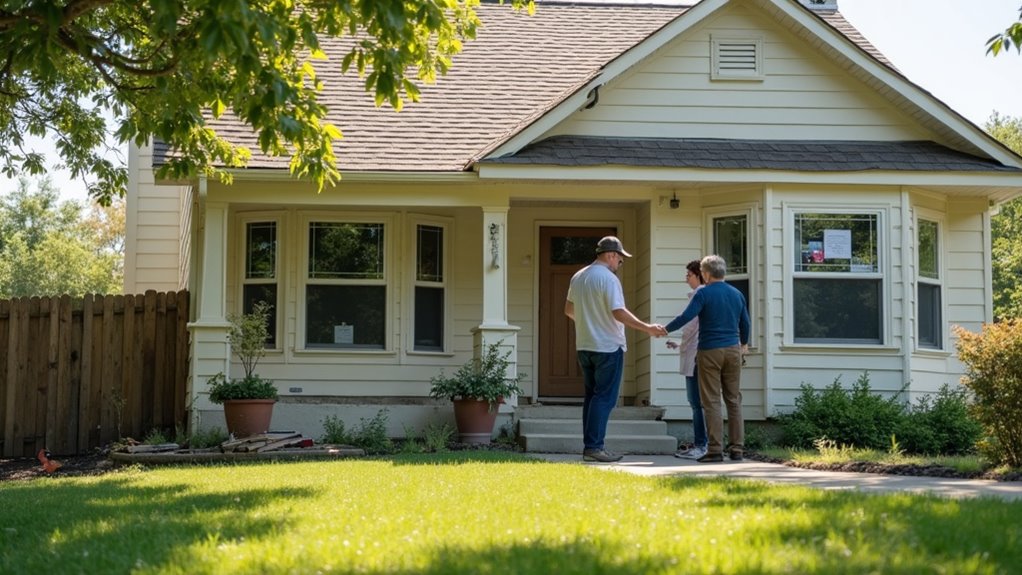
Open permits can lower your property’s value. These permits show that some work on the house is not finished or approved. Buyers and appraisers may see this as a risk. In some cases, disclosure laws require you to inform buyers about open permits and unresolved code issues, just as you must disclose the presence of hazards like asbestos.
Open permits signal unfinished or unapproved work, making your property seem risky and potentially lowering its value to buyers and appraisers.
Open permits can cause doubts about the safety and quality of the work done. If buyers worry about future repairs or legal problems, they may offer less money. Some buyers might avoid the property entirely.
Lenders often refuse to finance homes with unresolved permits. This can make it harder to find a buyer. If you are selling, be ready for negotiations about fixing these issues.
Closing open permits quickly can protect your property’s value. If you address these problems before selling, you may avoid lower offers. Handling open permits also builds trust with buyers.
If you want to avoid realtor fees and commissions, selling your house as-is to a local buyer can help you save money and simplify the process even if there are open permits.
Legal Obligations for Sellers Regarding Disclosure
If you are selling your home, the law usually says you must tell buyers about any open permits or code problems. Sellers must be honest about these issues to avoid legal trouble.
If you hide information, you could face lawsuits or lose the sale. If your property is tied to a land contract, you should also review the original contract for any disclosure requirements or restrictions on selling.
Home staging and good pricing will not protect you from these rules. Buyers can find out about problems during inspections or when checking the title. Being truthful from the start helps protect you and builds trust with buyers.
You should list all open permits and code violations in writing. Sellers need to give buyers any paperwork about city notices or repairs. If buyers ask questions, answer them clearly and fully.
Honesty keeps your home sale smooth and legal. If you want to sell your house fast without fees, working with buyers who purchase homes in any condition can help you avoid delays caused by these legal obligations.
Negotiating With Buyers When Issues Are Present
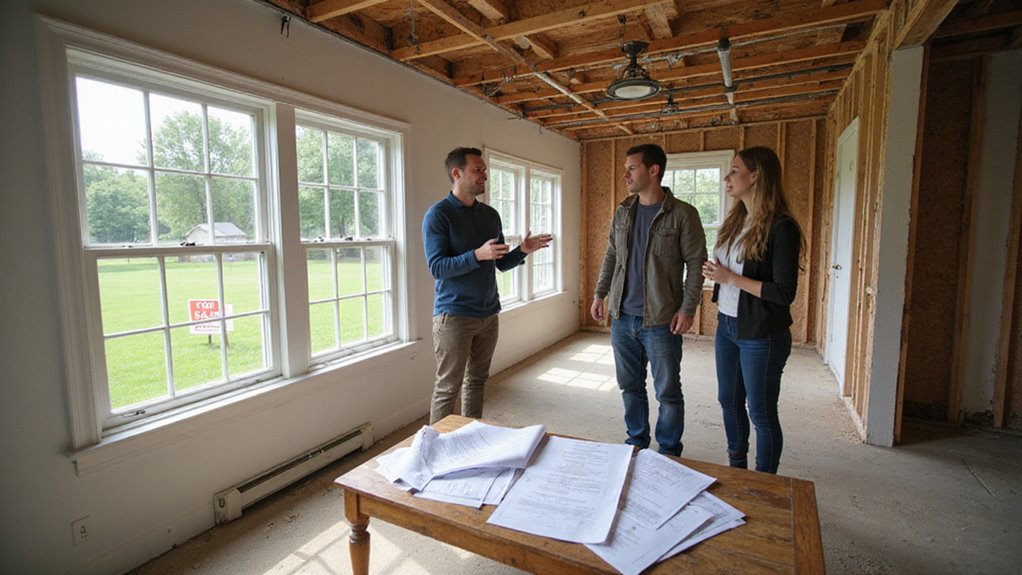
You need to address permit problems head-on by fully disclosing them to buyers, as transparency builds trust and reduces legal risks. Many buyers will expect concessions, so be prepared to offer repair credits or adjust the sale price accordingly. By handling these negotiations strategically, you can keep the deal on track and protect your bottom line.
If you’re looking for a fair cash offer and a hassle-free process, local buyers in West County, MO can help you sell your home as-is—even if there are open permits or code issues. Additionally, sellers should be aware that potential profits from the sale may be eligible for capital gains tax exclusions, provided specific residency and profit limits are met.
Disclosing Permit Problems
Sellers should tell buyers about any permit problems or code violations right away. Most states require you to share this information by law. If you hide these issues, you could face legal trouble later.
Written records of open permits or code violations are important. You should also explain what you have done or plan to do about these problems. If these issues could delay closing or affect insurance, you must say so.
Clear and honest communication helps keep the sale process smooth. If you share all details upfront, buyers will trust you more. This can make negotiations easier for everyone.
Offering Repair Credits
Offering repair credits means the seller gives money to the buyer instead of fixing problems. Buyers can use this money to make repairs after they buy the home. This gives buyers more control over how and when to fix issues.
Home staging can draw attention to your property’s best features. Hosting open houses can help buyers focus on the positives. If code violations exist, you should not try to hide them.
You need to show estimated repair costs in writing. Contractor estimates or inspection reports can support your credit amount. If you present the credit early, negotiations may go smoother.
Repair credits can help prevent deals from falling through. Buyers who want to customize their home may like this option. If you handle credits well, you could close the sale faster.
Resolving Open Permits Before Listing
Resolving open permits before listing a property is important. Open permits can cause delays or stop a sale. If you handle them early, you help avoid problems during escrow.
Buyers and agents will check permit records. Any open permits for electrical, plumbing, or other work may lead to fines or extra repairs. This can lower buyer confidence. Florissant homeowners often benefit from working with local experts who can guide them through the process and ensure all documentation is handled correctly.
Homeowners should call the local building department to check for open permits. If any permit is open, schedule the needed inspections. Make sure all work meets code and the permit is closed by officials.
If you resolve open permits before listing, you make your home more attractive to buyers. This also helps the sale process go smoothly. Homeowners who want to avoid these hassles can also consider selling to trusted cash home buyers who purchase houses as-is, even with open permits or code issues.
Addressing Unpermitted Work and Bringing It Up to Code
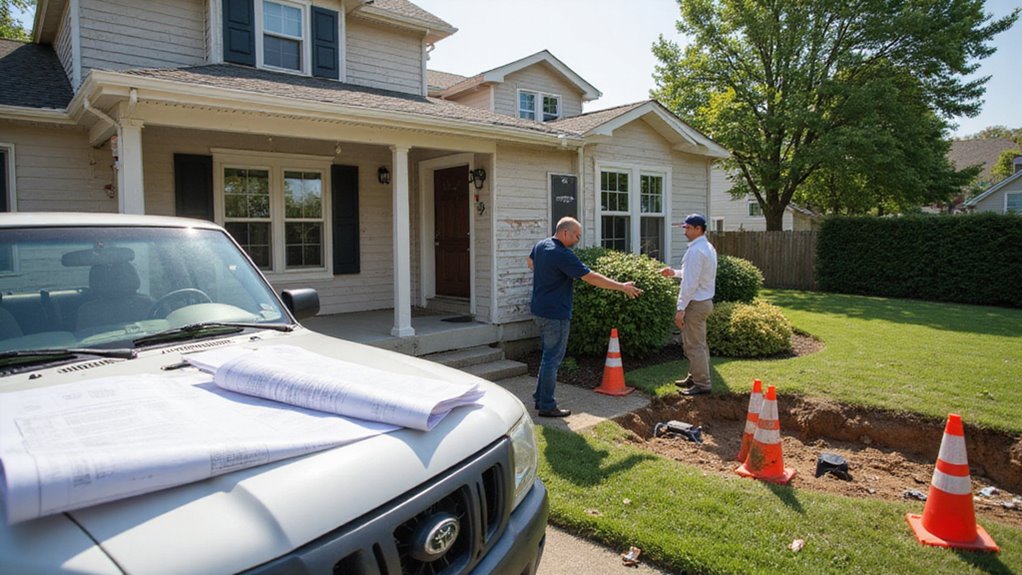
You need to identify any unpermitted renovations before listing your home, as these can lead to costly delays or negotiations. Once you’ve found unpermitted work, take clear steps to bring it into compliance with local building codes. Addressing these issues now protects your sale and reassures buyers.
It’s also important to be aware that special circumstances such as multiple owners or unresolved code violations can further complicate the selling process, so clear communication and proper documentation are essential.
Identifying Unpermitted Renovations
Unpermitted renovations are changes made to a home without proper approval. These can cause problems when selling your property. Early detection helps protect your home’s value and avoids issues with buyers.
Check your property’s public records for permits. If you find missing permits for recent changes, this could mean unpermitted work. Always review any additions, electrical, or plumbing updates for missing paperwork.
Look for signs of poor workmanship. Odd construction styles or mismatched materials may mean the work was not approved. If something looks out of place, investigate further.
Ask a home inspector or contractor for help if you are unsure. They can spot hidden problems like unsafe wiring or illegal room changes. If you follow these steps, you can better identify unpermitted renovations.
Steps for Code Compliance
If you find unpermitted work in your home, you need to fix it to meet code rules. This protects your property value and helps avoid problems when selling. You should contact your local building department to learn what steps are needed.
A home inspection can show what needs fixing. If repairs are needed, you can plan and budget ahead of time. This avoids last-minute issues with buyers.
Licensed contractors should handle any updates to meet code. After work is done, you must schedule inspections to check for compliance. If you keep all permits and reports, you make the selling process easier.
Proper documentation shows buyers and appraisers your home is legal and safe. If you are proactive, you can avoid future legal trouble. Meeting code protects your investment.
Working With Contractors and Inspectors
When selling a home with open permits or code issues, you need to work closely with contractors and inspectors. These professionals help fix problems and make sure all work follows local rules. If you coordinate well, your sale will go more smoothly.
A pre-listing inspection can find issues before you list your home. Early detection helps you avoid problems that might scare buyers later. If you address these issues early, you can save time.
Contractors should clearly explain all repairs and keep records of their work. Good documentation makes it easier to prove repairs meet code. If you share these records, the process will be more transparent.
Inspectors need access to the home and repair information. If you cooperate with them, re-inspections can happen faster. This helps prevent closing delays and keeps your sale on track.
The Role of Local Building Departments
The local building department checks that your home follows safety and building codes before you sell. If there are open permits or code problems, they must be fixed first. This approval is required before you can transfer the property.
If the department finds problems, they will ask for repairs or updates. You cannot close on the sale until these issues are resolved. Delays can happen if the work is not finished quickly.
Appraisers also look at open permits or code violations as risks. If there are unresolved issues, your home’s value may go down. Buyers or lenders may hesitate if you cannot show proof of compliance.
You should gather all documents that show your home meets local codes. Without them, selling your property may be difficult. The building department’s approval helps protect both the buyer and the seller.
Selling As-Is: Pros and Cons
Selling a home as-is means not fixing every permit or code problem before listing. This choice has both good and bad sides. You should think about these carefully before deciding.
If you sell as-is, you can close faster. The process skips repairs or closing permits, saving you time and money. Investors or buyers looking for a deal may find your home attractive.
However, fewer buyers may want a home with open permits or code issues. Offers are often lower since buyers plan for repair costs. If you insist on selling as-is, you may have less room to negotiate.
Financing and Insurance Implications
Selling a house with open permits or code issues can make financing and insuring the property difficult. Most lenders want a home with no unresolved issues. If problems exist, getting a traditional mortgage may not be possible.
Appraisers include repair costs when valuing your home. This can reduce the amount a buyer can borrow. Some loans may get denied if code problems are not fixed.
Title insurance companies may not issue a policy if permits are still open. Without clear title insurance, buyers could inherit legal or financial problems. Most buyers using conventional loans will want all issues resolved before closing.
Strategies for a Smooth Transaction
Selling a home with open permits or code violations can be challenging. You need to act early and stay organized to ensure a smooth sale. Clear steps can help you keep buyers interested.
Sellers should always disclose any open permits or code issues at the start. Early disclosure builds trust and avoids last-minute problems. Buyers appreciate honesty and are less likely to back out.
Professional home staging can make your property look its best. Staging draws attention to the home’s strengths and minimizes any flaws. Buyers might overlook paperwork if they see a home’s true potential.
It is important to set a fair and competitive price. Pricing should reflect both the home’s condition and any legal issues. A good price attracts buyers willing to handle extra work.
These actions can make negotiations simpler and help buyers feel confident. If you follow these steps, your sale is more likely to succeed.
When to Consult a Real Estate Attorney
You should consult a real estate attorney when selling a house with open permits or code issues. An attorney can explain your legal risks and help you follow the law. They will guide you on what to disclose and how to fix problems before listing.
If you plan to stage your home or make repairs, a lawyer can check that changes follow local codes. Attorneys also review neighborhood sales data to show how your home’s value may be affected. They explain how open permits could impact the sale timeline or the buyer’s financing.
If negotiations become complicated, an attorney protects your interests. They handle repair requests or credits from buyers. Legal help can make your sale smoother and prevent costly disputes later.
Conclusion
If you need to sell a house with open permits or code issues, the process requires careful planning. If you try to hide problems, buyers will likely find out during inspections. If you choose transparency, you protect yourself from legal and financial trouble.
If you want a faster solution, we buy houses for cash in any condition. If your house has code violations or permit problems, we can still make an offer. If you need to sell quickly, this option may work for you.
If you are ready to move forward, contact Freedom Path Investors today. If you reach out, we can discuss your situation and make a fair cash offer. Let us help you sell your home without hassle.

